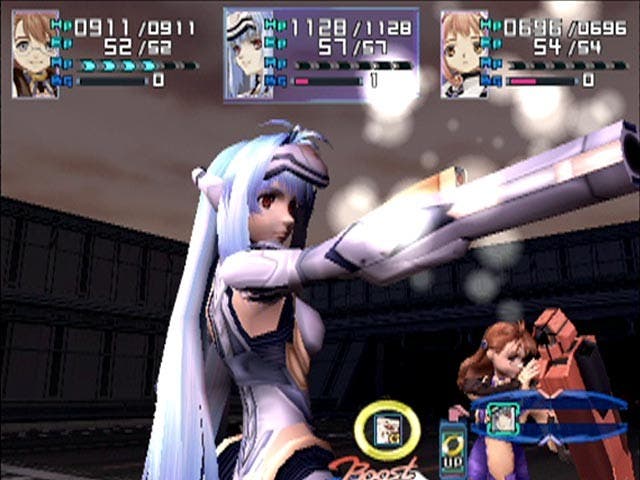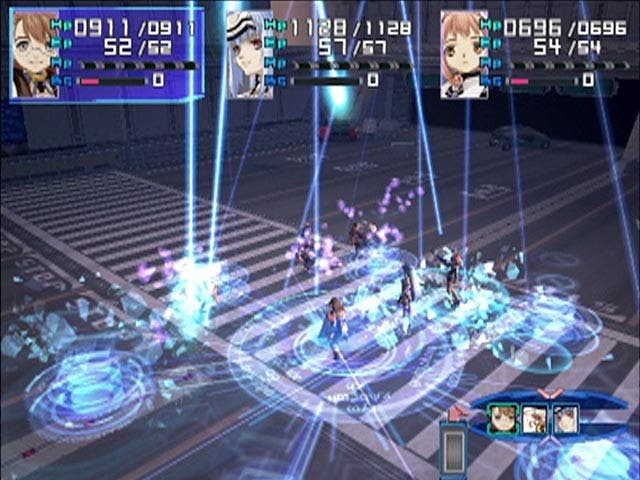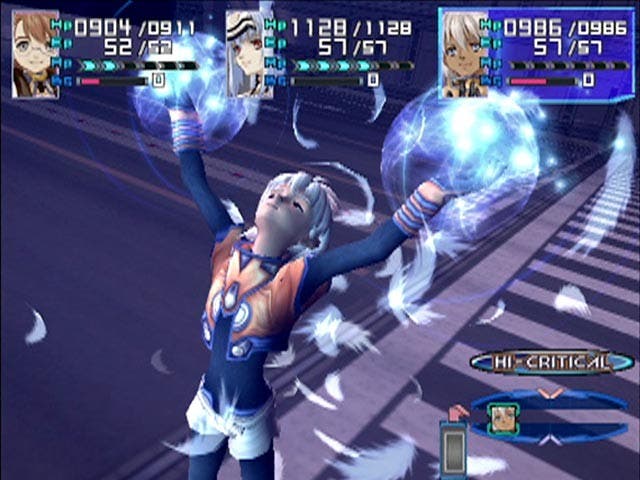XenoSaga Episode 1: Der Wille zur Macht
We may never get it in Europe, but we still love it.
When Final Fantasy VII arrived on the RPG-starved shores of Europe to a fanfare of critical acclaim and commercial success, we dared to hope for a while that in future, all console RPGs would make their to this side of the globe. However, although the subsequent Final Fantasy games have been released here as regularly as clockwork, less well-known RPGs are thin on the ground - and even some of Square's own masterpieces never made their way to Europe.
One of the games we missed way back in the PlayStation era was Xenogears, an epic RPG which was developed alongside Final Fantasy VII by a different team in Square. Xenogears was very different to Final Fantasy; it used fully rotating 3D environments with 2D sprite characters, it had cel animated cutscenes and a bizarre battle system which felt almost like a turn-based beat 'em up. It wasn't as polished as the legendary FFVII, and suffered from difficult pacing - at one point the game descended into a truly silly number of cutscenes, and the difficulty curve could be temperamental at times. However, the complex and multi-layered plot (which ran foul of easily outraged Christians in the USA), the fantastic characters and the stunning music (by Chrono Trigger's composer, Yasunori Mitsuda) were more than enough to mark Xenogears out as a true masterpiece and a high point in Square's RPG catalogue.
My God, It's Full of Stars

Of course, we Europeans never got to see any of this, unless we imported the game from the USA. One of the main elements of the plot of Xenogears was the idea that history repeats itself, over and over again - so perhaps we shouldn't be surprised that despite a new instalment in the Xenogears story having appeared in the USA many moons ago, it now looks very likely that we won't be seeing that either. The fact that Europeans aren't familiar with Xenogears is no excuse for this - Xenosaga Episode One actually starts the story from scratch, and you don't need to know anything about Xenogears to enjoy playing it.
Developed by Square spinoff studio Monolith and published by Namco, Xenosaga Episode One is the start of a hugely ambitious project - an attempt to produce a series of games covering the entire massive story arc which was revealed to a certain degree in Xenogears. As you might expect, then, it's a game whose plot is hugely ambitious, and aims to cover vast tracts of invented and borrowed mythology and pseudo-science. Packed to the gills with references to religion, philosophy and theoretical sciences, it's not a game for those who fancy a "stomp the bad guys" plot, but for anyone who enjoyed picking apart the theological threads of books like Philip Pullman's His Dark Materials trilogy or anime series like Neon Genesis Evangelion, this game is the pinnacle of that sort of storytelling.
Set in the distant future, the game focuses on events surrounding Shion, a scientist working for a massive corporation called Vector. She's working on a project to create a combat android, KOS-MOS, designed as a weapon against a vicious type of alien life form called the Gnosis, which have recently begun attacking human ships and settlements and cannot be repelled with normal weaponry. As you progress through the game, more and more mysteries are thrown at you which Shion gradually begins to unravel - from an entire planet which disappeared while an experiment was being carried out on a mysterious artefact as old as time itself called the Zohar, to the origins of the Gnosis and the pasts (and in some cases identities) of the band of adventurers which gradually forms around her.
Ye Shall Be As Gods

The game piles on plot elements and mysteries thick and fast; there's an evil organisation intent on doing something bad with the Zohar (maybe), factions within the Federation Government who are up to no good (probably), and minor questions such as what happened to humanity's long-lost homeworld, Earth (referred to throughout the game as Lost Jerusalem), or what exactly mysterious team members such as KOS-MOS and chaos actually are. We've rarely watched a TV series or read a book with this kind of complexity or depth in its plot, and the sheer breadth of imagination on display here is absolutely breathtaking.
If the last paragraph set alarm bells ringing in your skull, then it was for good reason - because as you might expect from a game which is as ambitious as this when it comes to plot, there is an absolutely incredible amount of dialogue and non-interactive cutscene in Xenosaga, and it's one of the most resolutely linear games we've ever played. The game is between 40 and 50 hours long, and there is a good 15 hours of cutscene in that, we'd imagine - in fact, within the first ten hours of gameplay, you're going to spend longer watching cutscenes than you are playing the game.
If you have a serious problem with that, then Xenosaga is quite clearly not the game for you - and although skipping the cutscenes is possible, it completely eliminates the entire point of playing the game. Although the graphics are absolutely beautiful - quite certainly among the best we've seen in any PS2 game, and certainly comparable with the other beauty queen of the RPG world, Final Fantasy X, and the battle system is relatively interesting and complex enough to keep you on your toes, this is a game that's all about the plot and characters.
Fetch the Popcorn

In general, a massive number of cutscenes isn't really such a good thing. Metal Gear Solid 2 is trumpeted as a fine example of a game which had simply far too many non-interactive sections, and it should be noted here that this particular reviewer hated that aspect of MGS2. However, for some reason, an even higher ratio of cutscenes to gameplay in Xenosaga doesn't grate in the slightest - quite possibly because not only is the plot being developed a fascinating one, but the production values in the cutscenes are absolutely incredible.
Every second of cutscene in the game is fully animated and directed, with the vast majority of character dialogue being voice acted by a group of genuinely good actors (perhaps not up to the standards of the incredible acting in Kingdom Hearts, but certainly a benchmark Square could do with taking note of). There's no equivalent of the shoddy "codec sequences" from MGS2 here, and in fact it's a genuine surprise at times when characters start speaking using text boxes again, because it happens so rarely.
It's a testament to the quality of the plot, scripts and direction of Xenosaga that online fans have actually compiled the cutscenes in the game into a set of TV-length episodes and distributed them illicitly among themselves - and the resulting "Xenosaga TV" series is in fact incredibly entertaining. We never thought we'd be singing the praises of a game which makes you spend half your time with your controller sat unwanted on your lap, but when you're this engrossed in a story, you hardly even notice that what you're doing barely qualifies for the phrase "playing a game".
"I don't want meaningless bloodshed..."

That's not to say that Xenosaga doesn't have excellent RPG gameplay once you actually get into the swing of the game. The battle system is an interesting one, consisting of chaining moves together and saving up "AP" between moves in order to perform specials, and a number of other quirks have been added to the turn-based combat system which make the whole affair significantly more tactical and interesting. Key among these is the "Boost" system, which allows you to interrupt the flow of play at any point and make a move with any character which has a full Boost bar - but certain enemies also use Boost, which gives them the ability to counterattack after you land certain types of attack.
The game also features powered armour suits, like miniature mechs, which your characters can get into during battle. These are a clear nod of the head to Xenogears, where giant robots called Gears were a core part of the game, but they play a far less important role in Xenosaga. Although you can spend ages tweaking and tuning your mobile suits (called AGWS), they're actually not shockingly useful in the majority of battles and there are pretty much no enemies who can't be defeated on foot. This is a little bit of a shame - it feels like the AGWS were added at the last minute in order to avoid upsetting Xenogears fans, rather than being a core part of the game balance from the outset.
The game also receives massive bonus points for avoiding the traditional RPG trap of confronting the player with countless random encounters; instead, you can see all monsters on the screen, and can choose whether to stand and fight, attempt to sneak past or simply run away. This is particularly helpful when you're solving a lengthy puzzle (of which the game has several), because you can usually clear all the creatures out of an area and then solve the puzzle at your leisure, rather being constantly interrupted by battles.
The graphics of the game, as previously mentioned, are absolutely stunning, and the developers have pulled off the very impressive trick of seamlessly merging pre-rendered video and in-game footage. In many cutscenes, pre-rendered footage is used only where certain effects were impossible in the in-game engine, and it's deliberately been designed such that you'll often not notice the transition from in-engine shots to pre-rendered shots and back again. The game only gives up its real graphical wonders gradually as you progress - every time you are taken aback by the immense scale of a spaceship or the ferocity of a battle, the chances are that the game has something even more impressive up its sleeve which you won't get to see for another couple of hours.
Unfinished Symphony
In short, we love Xenosaga. The game commits one of the cardinal sins of videogaming by taking control away from the player for a significant amount of the playtime, but the incredible plot and sheer style of the title are enough to absolve it of this sin, and then some. If we had a single complaint, it's the fact that the game is only the beginning of a longer series of games (Xenosaga Episode Two is currently in development at Monolith), and thus several of the greater mysteries of the game are only beginning to unravel by the time the game reaches its rather abrupt ending.
It's something of a reviewing cliché, but Xenosaga can really only be recommended to the gamers who "like this sort of thing". If the plot elements of games like Final Fantasy leave you cold, and you don't get excited just thinking about the prospect of a massive space opera storyline filled with religious symbolism and well-researched references to all manner of mythology, philosophy, science and psychology, then you will absolutely hate Xenosaga. On the other hand, if you're the kind of gamer who cried when you-know-who kicked the bucket in Final Fantasy VII, it's time for a trip to your friendly local import shop.

